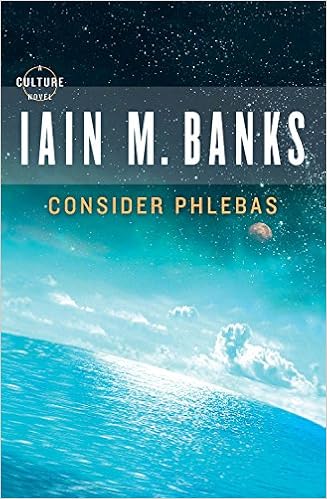I don't care how self-righteous the Culture feels, or how many people the Idirans kill. [The Idirans are] on the side of life—boring, old-fashioned, biological life; smelly, fallible and short-sighted, God knows, but real life. You're ruled by your machines. You're an evolutionary dead end. [p. 26]This was likely the first of Banks' SF novels that I read, back in the last millennium, and I don't think I've ever reread it. What did I remember? The finger scene: ugh.
The protagonist of Consider Phlebas is Bora Horza Gobuchul, a Changer (i.e. a shapeshifter, though taking on another's appearance is slow and effortful) who has been recruited by the effectively-immortal Idirans in their war against the Culture. Horza is sent by the Idirans to retrieve a Culture 'Mind', which he persists in thinking of as a machine although it's actually a sentient entity with free will. Cue an interstellar chase, with space pirates. weird cults, ancient temples, treachery, swashbuckling, comedy aliens (along with many that are not at all comic), romantic complications, and an enemy agent -- the magnificent Balveda -- who is more than a match for Horza.
I like Horza, though suspect I should not, as he is not actually a very nice person. His singlemindedness and courage, and his competence, make up for a lack of interpersonal warmth and a certain hollowness. (And it is not his fault that his girlfriend is fridged.)
I do vaguely recall reading the novel, being shocked by the abrupt ending, and shocked all over again that, according to the appendices, the events of the novel happen centuries in our past. So, a bit like Star Wars, I suppose: long ago, in a galaxy far away ... I've been thinking about why this was a shock, and I suspect it's because I unconsciously expected this to be our future, the future of Earth-origin humans -- not of human-type aliens who have nothing to do with me, us, Earth.
I note that I don't tend to reread Banks' novels (not sure why, though it may simply be bad timing on my part: I didn't enjoy The Algebraist as a holiday read) and I'd somehow forgotten just how entertaining, witty and inventive a writer he was. Reading Consider Phlebas felt like a headlong rush through a plethora of big-screen space-opera settings, but there was also plenty of character interaction, philosophy (Horza is highly critical of the Culture, though I think his views are founded at least partly on misconceptions) and conflict. I think it could make great TV, and a series is in production: I might even get around to watching it.

No comments:
Post a Comment